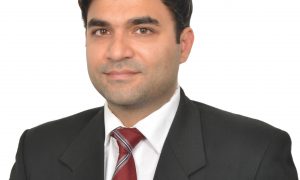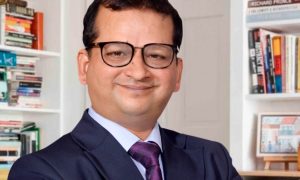This interview has been published by Namrata Singh and The SuperLawyer Team

You have an impressive academic background in law and accounting, coupled with your experience in the Field Intelligence Corps. Can you share with us what inspired you to pursue a career in tax law, and how your journey has evolved from your early days as a legal intern to becoming a Partner at Herzog, Fox & Ne’eman?
My path to tax law began at university. However, with Israel having the highest density of lawyers per capita in the world, I wanted to have something extra to stand out. My interest in finance led me to pursue an accounting degree alongside law. I enjoyed almost all of my legal courses, but tax law stood out and felt like the perfect combination of my interests. Additionally, in tax practice, both areas of expertise (law and accounting) come together, allowing me to maximize the use of my knowledge and capabilities.
Becoming a partner at Herzog, Fox & Ne’eman, Israel’s leading law firm, was a goal I set from the start. After law school at the Hebrew University of Jerusalem, which is probably the best law faculty in Israel, I was allowed to intern at Herzog, and even though I left for a few years to complete my CPA qualification, I was determined to return. That persistence, combined with hard work and dedication after rejoining the firm, eventually promoted me as a partner in the tax department.
Your experience as a commanding officer in the Field Intelligence Corps must have provided you with unique leadership skills. How has your military background influenced your approach to leading teams and managing complex tax cases? Could you please share your experience as a commanding officer?
While there are key differences between leading military teams and legal teams, the core principle remains the same: leadership isn’t about rank; it’s about professionalism, setting an example, and teamwork. If your team looks up to you and knows you have their best interests at heart, they’re more likely to be motivated and committed to the work.
My military experience also taught me that pushing a team too hard can backfire. There’s a fine line between creating a disciplined, professional team and overwhelming them. This balance is something I carry with me when managing legal teams today. Another key takeaway from military service is perspective. After leading teams under life-threatening conditions, I’ve developed a calmness in office life. Having experienced the intensity of field command, I received tools (such as the importance of preparations, practice, meeting timelines, etc.) that helped me stay more focused in the face of tough client meetings or deadlines. In my opinion, understanding this balance is crucial for every legal practitioner.
Could you please describe some of the most challenging tax cases you’ve handled, particularly those involving international aspects like MAPs (Mutual Agreement Procedures) and APAs (Advance Pricing Agreements)?
Dealing with multinational enterprises, aggressive tax authorities, and multi-million-dollar tax assessments can be complex, but that’s what makes these cases so interesting. Over the years, I have been involved in numerous tax audits, many of which eventually developed, per Herzog’s recommendation, into MAPs. One case involved an Israeli subsidiary of a major US tech company. The Israel Tax Authority (ITA) claimed that the Israeli company transferred all its functions, assets, and risks (FAR) to its non-Israeli parent company shortly after its acquisition. This argument is raised by the ITA against almost every Israeli company acquired by a multinational group. The ITA’s position, which we believed was baseless, resulted in a USD 40 million tax assessment. After the taxpayer’s administrative appeal was rejected by the ITA, we took the case to the Israeli District Court. At this stage, we also recommended the taxpayer initiate a MAP. After years of litigation and negotiations, the ITA eventually admitted to the US Competent Authorities that it could not support its arguments and dropped the assessment entirely, accepting the original tax returns.
Another interesting international case I handled did not require a MAP, fortunately, but demonstrated some of the challenges that global activities of multinational enterprises (MNEs) create from a tax perspective. In this case, we had to convince the ITA of the appropriateness of a complex transfer pricing method, which resulted in most Israeli revenue and potential profits being attributed to other group entities. The case involved an Israeli subsidiary of a European-based multinational group. The group implemented a complex transfer pricing methodology called the Residual Profit Split Method (RPSM) for allocating profits among group entities based on their contributions to the business. After multiple meetings, the ITA accepted the methodology and its implementation and upheld the company’s tax filings. This was especially challenging, considering the fact that the ITA’s ability to audit the worldwide implementation of the transfer pricing methodology by the group was limited.
How do you stay updated with the ever-evolving tax laws and regulations both in Israel and internationally? Are there specific resources or practices that you rely on to maintain your expertise?
Staying up to date is crucial for every law practitioner, especially in the dynamic field of tax law. I follow newsletters from top law and accounting firms in Israel and abroad, keep an eye on updates from the ITA, review court cases weekly, and attend both local and international tax conferences.
At Herzog (and also PwC Israel, where I worked for two years), we encourage our teams to stay updated and hold periodic update meetings. We have regular team discussions to review new developments, which help everyone stay sharp. Personally, I make it a point to dedicate at least one hour a week to reading and catching up on new developments. I also try to learn as much as I can from my team and partners: if I overhear an interesting discussion between partners, I try to participate, even if it’s not billable (yes, billable hours aren’t everything!).
Additionally, outside of formal meetings, I often discuss cases and ideas with colleagues. These discussions are invaluable for staying current in such a fast-changing environment.
You’ve been involved in drafting responses to the Israel Tax Authority’s circulars and proposed legislation. What role do you think legal professionals should play in shaping tax policy, and how do you approach this task?
Tax law is intricate, and changes in one area can have a ripple effect on others, impacting various aspects of taxpayers’ business activities. That’s why legal professionals must be involved in shaping tax policy. The Israel Tax Authority has significant expertise, but legal practitioners bring insights from daily interactions with clients and authorities. This practical experience is invaluable for refining policies and regulations.
When working on policy, I believe it’s important to broaden our perspective beyond just clients’ interests. We need to think about what’s best for the taxpayers, the business community, and the overall relationship with tax authorities. Constructive feedback from legal professionals can lead to better, more balanced tax laws and policies. Working on legislation allows practitioners and regulators to collaborate, fostering relationships that may later be beneficial for more efficient tax audits.
Throughout your career, you have mentored teams and led significant tax projects. What key lessons have you learned that you believe are crucial for young legal professionals entering the tax field today?
My advice is simple: aim high and always strive to do your best. Surround yourself with the best people, challenge yourself, and continually seek improvement. The best way to grow is by pushing yourself, whether through challenging tasks or by working with top professionals, which often goes hand-in-hand with studying or working at highly-ranked universities or firms.
Also, never underestimate the value of learning from those around you. You can learn from anyone—a boss, a colleague, even representatives of the tax authorities. Every task, no matter how small, is a learning opportunity. Pay attention to details, understand the bigger picture even if your task is limited, and don’t be afraid to ask questions when the time is right.
Looking forward, what do you see as the biggest challenges and opportunities in the field of tax law, particularly in the context of digital economies and global trade?
The ever-increasing global trade and the digitization of commerce present significant challenges and opportunities in tax. On one hand, businesses can now operate in markets and jurisdictions previously inaccessible. Additionally, tax authorities are offering incentives to encourage companies to relocate. On the other hand, new regulations like the OECD’s BEPS project, especially Pillar 1 and Pillar 2 rules, are adding layers of complexity to tax planning and compliance for multinational enterprises. These trends will require tax professionals to be more creative than ever, developing a deep understanding of clients’ business activities and becoming familiar with global tax regimes to provide the best advice.
AI technologies could also significantly impact the tax field. While tax authorities are in the early stages of using machine learning and big data, it’s likely only a matter of time before these tools are more widely adopted in audits. This will create challenges for taxpayers but also open new opportunities for professionals prepared to navigate these changes.
With your demanding career and significant responsibilities, how do you find time to unwind? What are some of your favorite ways to relax and recharge outside of work?
Maintaining work-life balance is a challenge, but I’ve learned that it’s essential. Early in my career, I had a rule of not working at home, even if it meant long hours at the office, late nights, etc. At a certain point, I decided to change my approach. Now, I wake up earlier to exercise, tend to my garden, and spend time with my dog before starting the day. I also make it a point to have dinner with my family, recharging before diving back into work later in the evening. This balance has made a significant difference.
Get in touch with Ronen Avner–


























